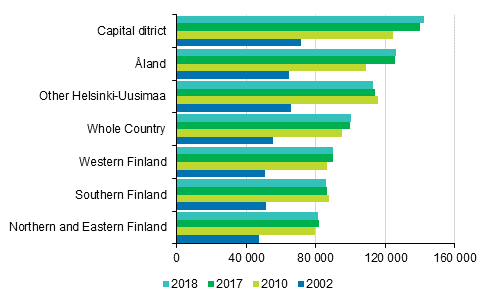Published: 20 June 2019
Household-dwelling units in Greater Helsinki have the largest housing loans
Statistics Finland’s statistics on indebtedness show that the average size of housing loan per household-dwelling unit with a housing loan was EUR 100,030 in 2018. Housing loans were largest in Greater Helsinki, EUR 142,130, on average. Housing loans were lowest, EUR 81,200, on average, for household-dwelling units in Northern and Eastern Finland. Average housing loans increased only in Greater Helsinki, by 1.8 per cent and in ┼land, by 0.7 per cent from 2017. In the rest of Finland, average housing loans decreased slightly.
Average housing loans of household-dwelling units with housing loans in 2002, 2010 2017 and 2018, EUR in 2018 money

Slightly over one-half of all household-dwelling units, or 1.4 million, had debts in 2018. Their total debt amounted to EUR 123 billion, which in real terms is close on one per cent more than in the year before. Of household-dwelling units' debts, EUR 87.8 billion were housing loans, EUR 8.2 billion were loans charged on business activities or a source of income, and EUR 27.0 billion were other debts. Loans charged on business activities or a source of income increased most from 2017, by 9.7 per cent. These include, e.g. debts for acquisition of shares or residential investment properties. Household-dwelling units had roughly as much housing loans and other debt as in the year before.
One-third of household-dwelling units has housing loans. Two-supporter families with children had most often a housing loan, of whom 71 per cent were with housing loans. Among one-person household-dwelling units slightly under one-fifth had housing loans. Among those living alone, people aged 35 to 44 had most often housing loans, 36 per cent of them had a housing loan. In childless household-dwelling units with two adults, 30 per cent had housing loans, among whom most often those aged 35 to 44, of whom 60 per cent had housing loans.
The number of household-dwelling units with housing loans among the youngest age groups decreased from the year before and the number of household-dwelling units with housing loans increased most in the oldest age groups. There were around 2.5 per cent fewer household-dwelling units aged under 35 with housing loans compared to 2017, while the number of pensioners with housing loans increased by as much.
Two-supporter families with children had, on average, EUR 135,770 in housing loans, single-supporter families EUR 90,590, childless household-dwelling units with two adults EUR 86,540 and one-person household-dwelling units EUR 67,740. Two-supporter families with children where the reference person was aged 25 to 34 had most housing loans, EUR 152,190, on average.
One-quarter of indebted household-dwelling units had at most EUR 10,000 in debts and one-half at most EUR 50,000 in 2018. Altogether, 451,800 household-dwelling units had over EUR 100,000 in debts and 156,900 household-dwelling units had at least EUR 200,000 in debts. Thus, 5.8 per cent of all household-dwelling units, and 11.0 per cent of indebted household-dwelling units had over EUR 200,000 in debts. They had 41 per cent of all household-dwelling units’ debts and 40 per cent of housing loans. A total of 54,800 household-dwelling units had debts of at least EUR 300,000, being 3.8 per cent of all indebted household-dwelling units.
In relative terms, large debts were most prominent in ┼land, where 1,700 household-dwelling units or 12 per cent of all household-dwelling units had debts of at least EUR 200,000. Among household-dwelling units in Greater Helsinki and in the major region of Helsinki-Uusimaa nine per cent had this much debt. In the rest of Finland, four to five per cent of household-dwelling units had debts this large. The number of household-dwelling units with this much debt grew most in Greater Helsinki, by five per cent from 2017.
In 2018, household-dwelling units paid EUR 1.6 billion in interests, which was roughly the same amount as in the year before. Of them, EUR 873 million were interest expenses from housing loans, which was three per cent less than in the year before. Households paid an average of EUR 1,144 in interests per indebted household-dwelling unit, while the corresponding figure in 2017 was EUR 1,155. On average, household-dwelling units with housing loans paid EUR 995 in interests on their housing loans. Of indebted household-dwelling units, 60 per cent, or 858,660 paid at most EUR 1,000 per year in interests and three per cent, or 38,810 household-dwelling units over EUR 5,000.
Source: Indebtedness 2018, Statistics Finland
Inquiries: Timo Matala 029 551 3422, toimeentulo@stat.fi
Director in charge: Jari Tarkoma
Publication in pdf-format (166.6 kB)
- Tables
-
Tables in databases
Pick the data you need into tables, view the data as graphs, or download the data for your use.
Updated 20.6.2019
Official Statistics of Finland (OSF):
Indebtedness [e-publication].
ISSN=2489-3285. 2018. Helsinki: Statistics Finland [referred: 22.2.2026].
Access method: http://stat.fi/til/velk/2018/velk_2018_2019-06-20_tie_001_en.html

